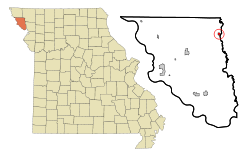Maitland, Missouri
| Maitland, Missouri | |
|---|---|
| City | |
 Location of Maitland, Missouri |
|
| Coordinates: 40°12′5″N 95°4′32″W / 40.20139°N 95.07556°WCoordinates: 40°12′5″N 95°4′32″W / 40.20139°N 95.07556°W | |
| Country | United States |
| State | Missouri |
| County | Holt |
| Area | |
| • Total | 0.30 sq mi (0.78 km2) |
| • Land | 0.30 sq mi (0.78 km2) |
| • Water | 0 sq mi (0 km2) |
| Elevation | 945 ft (288 m) |
| Population (2010) | |
| • Total | 343 |
| • Estimate (2012) | 322 |
| • Density | 1,143.3/sq mi (441.4/km2) |
| Time zone | Central (CST) (UTC-6) |
| • Summer (DST) | CDT (UTC-5) |
| ZIP code | 64466 |
| Area code(s) | 660 |
| FIPS code | 29-45596 |
| GNIS feature ID | 0730138 |
Maitland is a city in Holt County, Missouri, United States. The population was 343 at the 2010 census. At one point the city billed itself as the "Bluegrass Mecca"—home to the largest bluegrass farm in the world.
Maitland was platted in 1880. The town is named for John Skirving Maitland who was a surveyor for the Nodaway Valley Railroad (the construction company for the Kansas City, St. Joseph and Council Bluffs Railroad) that arrived in Maitland in 1880 when its superintendent John Fisk Barnard bought the land for the town from John S. and Delila Swope. The railroad would eventually be taken over by the Burlington Northern Railroad before eventually being abandoned.
The town is a farming community. One of the neighbor farmers was David Ward King, inventor and promoter of the King road drag—an invention that essentially was two logs lashed together and dragged behind horse or mule teams that was an effective and inexpensive method to grade dirt roads. It was the horse drawn forerunner of the modern road grader. The invention came at the time Henry Ford started to mass-produce automobiles. Before its invention, wet country roads became muck and were often nearly impassable. The use of the King Road Drag kept rural roads solid, even when wet, which made them passable all the time. These improved rural roads made possible both the advent of the automobile and rural mail delivery.
In the first half of the 20th Century, Maitland claimed to have the largest bluegrass seed producing farm in the world. John Q. Weller was to claim that the 10,000,000 pounds (4,500,000 kg) of seed produced on his farm was more than the harvested seed output of the entire state of Kentucky. In some years, Weller would get permission to pile up bumper crops of seed on the city streets. During the harvest time in late June/early July, the town hosted a Bluegrass festival.
Bluegrass seed production in the late 1950s/early 1960s moved to farming communities in Idaho, Oregon, and Washington. The Festival has been discontinued.
In 1975 the Maitland Community Betterment Association celebrated the bluegrass stripping heritage with the slogan, "Home of the Strippers."
...
Wikipedia
